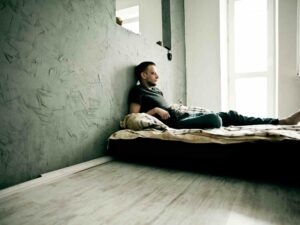If you are living with bipolar disorder, then you may be familiar with the term “rapid cycling.” This occurs when a person experiences four or more episodes of mania, hypomania, or depression in a 12-month period. Rapid cycling can make life very difficult for those who are affected by it. In this blog post, we will discuss what rapid cycling bipolar is, and some of the symptoms that are associated with it. We will also provide information on how to get help if you are experiencing this condition.
Contents
What Is Rapid Cycling Bipolar?
 Rapid cycling bipolar is a form of bipolar disorder characterized by four or more episodes of mania or depression in 12 months. It’s the most severe type of bipolar disorder and can be very debilitating. If you have rapid cycling bipolar, you may feel like you’re on a roller coaster ride of emotions, going from highs to lows very quickly.
Rapid cycling bipolar is a form of bipolar disorder characterized by four or more episodes of mania or depression in 12 months. It’s the most severe type of bipolar disorder and can be very debilitating. If you have rapid cycling bipolar, you may feel like you’re on a roller coaster ride of emotions, going from highs to lows very quickly.
This condition is often misdiagnosed as borderline personality disorder or attention deficit hyperactivity disorder (ADHD). It’s important to get an accurate diagnosis so you can receive the proper treatment. The reason behind misdiagnoses is that the symptoms of rapid cycling bipolar can be similar to other mental health conditions.
Rapid cycling bipolar is more common in women than men and usually begins in adulthood. There are a few possible explanations for why this occurs, but it’s not fully understood. So it is important to get an accurate diagnosis and treatment plan as soon as possible. A mental health professional can give you a comprehensive evaluation and make a diagnosis.
How To Identify It?
Several things can help you identify if you have rapid cycling bipolar. First, it’s important to know the symptoms of bipolar disorder. These include:
- Mania: This is when a person experiences an elevated mood along with increased energy, decreased need for sleep, and impulsive or risky behavior. Mania is often followed by a period of depression. For example, if a person with bipolar disorder suddenly starts sleeping very little, talking very fast, and has a lot of energy, they may be experiencing mania.
- Depression: It is a symptom of bipolar disorder characterized by a persistently low mood. People with depression may feel hopeless, helpless, and worthless. They may also have physical symptoms such as fatigue, weight loss or gain, and difficulty sleeping.
The other symptoms of rapid cycling bipolar disorder include:
- mood swings that last for a day or two,
- sudden changes in energy levels,
- irritability,
- anxiety,
- anger, and
- impulsiveness.
These are some common symptoms associated with rapid cycling bipolar disorder. However, it’s important to remember that everyone experiences bipolar disorder differently. If you think you may have rapid cycling bipolar disorder, it’s important to talk to your doctor. They can help you make a diagnosis and develop a treatment plan.
However, you should also keep in mind that there are other conditions that can cause similar symptoms. So, if you have any concerns, it’s best to talk to your doctor to rule out any other potential causes.
What Triggers Rapid Cycling Bipolar?
 When it comes to rapid cycling bipolar, there are a few different things that can trigger it. Some of the most common triggers include:
When it comes to rapid cycling bipolar, there are a few different things that can trigger it. Some of the most common triggers include:
Stressful life events
It is believed that stressful life events can trigger rapid cycling bipolar in people who are already predisposed to the condition. This can be anything from the death of a loved one to losing your job. For instance, if you were to lose your job, it could trigger a manic episode. And if someone you love were to die, it could trigger a depressive episode.
Sleep problems
Sleep problems are also thought to be a trigger for rapid cycling bipolar. This is because sleep plays a vital role in our mood and overall health. If you’re not getting enough sleep, it can lead to an imbalance in your brain chemistry, which can trigger a manic or depressive episode. Because when you’re sleep-deprived, your body isn’t able to function properly.
Changes in medication
If you are taking medication for bipolar disorder and you suddenly stop taking it or change the dosage, this can trigger a rapid cycling episode. Be sure to talk to your doctor before making any changes to your medication regimen. Otherwise, it may be difficult to manage your symptoms and stability.
Alcohol or drug abuse
Sometimes, people with bipolar disorder try to self-medicate by drinking alcohol or using drugs. This can make the symptoms worse and lead to addiction. As alcohol and drugs can trigger bipolar episodes, it’s important to avoid them if you have the condition. Drugs and alcohol abuse can cause:
- Anxiety
- Depression
- Mania
- Psychosis
It may be difficult to stop drinking or using drugs if you’re addicted, so you may need professional help.
Hormonal changes
This trigger is very common in women because in life there are so many hormonal changes. Some of these common changes include:
- Childbirth
- Puberty
- Menopause
- Menstrual cycle
So even a small change in hormone levels can cause a big change in mood. You should always speak to your doctor if you’re concerned about your hormones affecting your bipolar disorder.
Overall, these are some common triggers that can bring on a bipolar episode. It’s important to be aware of them so you can manage your condition better. If you think you’re experiencing an episode, speak to your doctor immediately. Early help and awareness are key to managing bipolar disorder.
How Does It Impact Life?
Sometimes, rapid cycling bipolar disorder causes several consequences and complications in a person’s life, including:
Decreased productivity at work or school
 This is because the symptoms of rapid cycling bipolar disorder can make it difficult to concentrate, pay attention, and remember information. As a result, people with this condition may have a hard time completing tasks, meeting deadlines, and keeping up with schoolwork or work assignments.
This is because the symptoms of rapid cycling bipolar disorder can make it difficult to concentrate, pay attention, and remember information. As a result, people with this condition may have a hard time completing tasks, meeting deadlines, and keeping up with schoolwork or work assignments.
Problems with relationships
The symptoms of rapid cycling bipolar disorder can also disrupt personal relationships. For example, people with this condition may have difficulty maintaining healthy boundaries in their relationships or they may act impulsively, which can lead to conflict. It is often difficult for people with rapid cycling bipolar disorder to stick to treatment plans, which can also cause strain on personal relationships.
Poor decision making
This seems to be a common consequence among those with rapid cycling bipolar. Making decisions can be difficult at the best of times, but when your mood is constantly changing it can feel impossible. You may find yourself impulsively spending money or quitting your job without any plan in place.
Legal problems
Rapid cycling bipolar symptoms can sometimes cause people to act impulsively and make poor decisions. This can lead to problems with the law, such as getting arrested for disorderly conduct or driving under the influence. If you have rapid cycling bipolar, it’s important to be aware of these potential risks and take steps to avoid them.
Self-harm or suicidal thoughts
People with rapid cycling bipolar disorder are more likely to experience self-harm or suicidal thoughts than those with other types of bipolar disorder. If you have any thoughts of harming yourself, it’s important to get help immediately from a mental health professional or hotline.
So these are common negative consequences that a person can experience when they have rapid cycling bipolar disorder. As you can see, it’s a serious mental illness that requires professional treatment. If you or someone you know is struggling with bipolar disorder, don’t hesitate to reach out for help. There are many resources available to get the support you need.
How To Treat Rapid Cycling Bipolar?
 It becomes very difficult to treat bipolar when it rapidly cycles. The regular mood stabilizers don’t seem to work as well, and the person often feels like they are on a roller coaster of emotions. If you have rapid cycling bipolar, it is important to find a treatment plan that works for you.
It becomes very difficult to treat bipolar when it rapidly cycles. The regular mood stabilizers don’t seem to work as well, and the person often feels like they are on a roller coaster of emotions. If you have rapid cycling bipolar, it is important to find a treatment plan that works for you.
There are a few things that can be done to help treat rapid cycling bipolar. Some common treatment options include:
Medication
There are a number of different medications that can be used to help stabilize moods. Often, a combination of drugs is needed to effectively treat rapid cycling bipolar. Also, it is important to work with a psychiatrist who is experienced in treating bipolar disorder. Some common examples of mood stabilizing medications include:
- Lithium
- Anticonvulsants
- Atypical antipsychotics
Medications can cause side effects, so it’s important to work with a psychiatrist who can monitor your progress and adjust your medications as needed.
Therapy
Therapy can be an effective treatment for bipolar disorder. It can help you understand your condition and develop coping skills. Therapists who are experienced in treating bipolar disorder can be very helpful. There are various types of therapy, and some may be more effective than others. You may need to try different types or combinations of therapies before you find what works best for you.
Some common types that you can discuss with your therapist include:
- Cognitive behavioral therapy (CBT): This type of therapy can help you identify negative thought patterns and behaviors and replace them with more positive ones.
- Interpersonal and social rhythm therapy (IPSRT): This therapy focuses on helping you establish regular routines for sleeping, eating, and other activities. It can also help you improve your relationships.
- Psychodynamic therapy: This therapy explores the role of past experiences and emotions in your current mood and behavior.
- Family-focused therapy: This type of therapy can help improve communication and problem-solving skills within your family. It can also help reduce stress and conflict.
Electroconvulsive Therapy (ECT)
ECT is a safe and effective treatment for rapid cycling bipolar. It can be used as a first-line treatment or in combination with medication. If you have rapid cycling bipolar, talk to your doctor about ECT. ECT is a brief electrical stimulation of the brain that is administered under general anesthesia. It is usually given three times a week for two to four weeks.
It is an effective treatment for rapid cycling bipolar because it can help to stabilize mood and improve mental functioning. Generally, people who have ECT will see a significant improvement in their symptoms within the first two to four weeks of treatment. If you are considering ECT, it is important to talk to your doctor about the potential risks and benefits.
Lifestyle changes
 This is one of the most important things you can do to manage your rapid cycling bipolar.
This is one of the most important things you can do to manage your rapid cycling bipolar.
You should:
- exercise regularly
- get enough sleep
- eat a healthy diet
- avoid alcohol and drugs
- manage stress
These things will help you feel better and make it easier to stick to your treatment plan. More often than not, people with rapid cycling bipolar also have other mental health conditions. This is called comorbidity. So when you’re making lifestyle changes, it’s important to also think about ways to manage any other conditions you may have.
All in all, it is an essential part of managing your condition and improving your quality of life. With the right treatment and support, you can live a fulfilling life despite having this condition.
Conclusion
To conclude, rapid cycling bipolar is a serious mental illness that should not be taken lightly. If you or someone you know is struggling with bipolar disorder, it is important to seek professional help. There are many resources available to those who need assistance. With proper treatment, people with bipolar disorder can live full and productive lives.
You should always remember that if you are feeling like you might be going through a tough time, so please reach out for help from a professional. They can help you understand your options and get the treatment that is best for you.
For more tips and guidance, you can reach out to Therapy Mantra. The team of professional counselors is more than happy to help you in your journey to recovery. Contact us today to learn more about our services. You can also book an online therapy session or download our free Android or iOS app.


